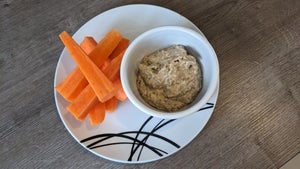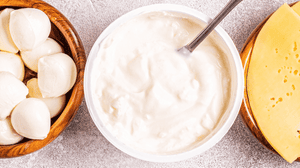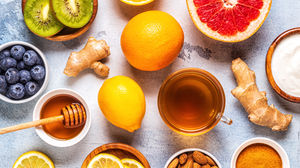According to BUPA, around one in five UK adults experience irritable bowel syndrome[i], or IBS. In fact, experts think that since so few seek help for this sometimes-embarrassing condition, there could be far more people out there dealing with this daily discomfort.
Whether IBS is an occasional irritant or a detrimental day-to-day displeasure, we’re here to give you the lowdown on IBS symptoms, the causes of this gastrointestinal disease and, perhaps most importantly of all, the information you need to help support your own gut health.
What is IBS?
An extremely common, usually lifelong condition, IBS affects the gastrointestinal system, causing a variety of uncomfortable symptoms. There’s no cure and doctors can’t quite put their finger on the causes of IBS but this is what we do know…
The symptoms of IBS
IBS is a group of symptoms that usually happen at the same time or in irritating succession. When diagnosing the problem your GP may expect symptoms to have occurred for at least three days per month for three months[ii]. And though there’s no test for IBS, a few may be carried out to rule out other issues[iii]. According to the NHS, the most common symptoms of IBS are:
Stomach pain and cramps, usually after eating
Bloating
Diarrhoea
Constipation
Other symptoms including flatulence, nausea, tiredness and bowel incontinence
Some people will experience diarrhoea only (known as IBS-D) while others only have constipation during a flare up (IBS-C). However, many with IBS will experience alternating episodes of each.
Why does IBS happen?
Although experts can’t say for sure why so many of us experience the symptoms of IBS they do have some good ideas. Often the onset of IBS appears to be preceded by antibiotic use or a bout of gastroenteritis or it can appear alongside another closely related condition such as inflammatory bowel disease (IBD). And though there’s no proof of a genetic link, it does appear that you’re more likely to have IBS if someone else in your family has it.
There may also be a connection between IBS and the nerves in your gut and between IBS and stress. Additionally, some studies show that an imbalance in your gut bacteria (known as dysbiosis) is linked to IBS symptoms[iv].
The IBS-stress connection
We’ve all experienced the physical signs of stress. The rapid heartbeat, the lump in the throat, the sweaty palms. So we know that stress can manifest physically as well as mentally. Studies tell us that there is a direct connection between what happens in our brain and what’s going on in our gut (and vice versa). This is known as the gut-brain axis, and it carries feelings of stress and anxiety to our bowels and intestines[v] where, if we’re unlucky, they manifest in IBS-type symptoms.
How Are IBS and Diet Connected?
Is there a link between what we eat and how our bowels react? Absolutely! But figuring out how food can trigger IBS symptoms isn’t that straightforward.
Foods commonly associated with IBS
Certain foods are recognised as frequent IBS triggers, causing diarrhoea (most often) in numerous people with the condition. Milk, cream and cheese, are common culprits, with many IBS sufferers choosing to dodge the dairy. Fizzy drinks, caffeine and chewing gums or sweets containing artificial sweeteners—sorbitol and xylitol, for example—are also linked to symptoms. Doctors also suggest avoiding alcohol.
Processed food and IBS
It’s a fact of life that processed foods are everywhere. Even the most basic of ingredients will often be processed in some way. And it’s difficult to dine without indulging in some form of heavily processed food, such as ready meals, convenience lunches or supermarket-bought sauces.
It’s no coincidence that the prevalence of IBS has risen along with our reliance on what are known as ultra-processed foods. Indeed, a long term, large scale study shows an unarguable link between these modern convenience foods and an increased risk of IBS[vi].
I have IBS, do I need to worry about FODMAPs?
If you’ve done any of your own research into IBS you’ve almost certainly read about fermentable oligosaccharides, disaccharides, monosaccharides and polyols. FODMAPs (to give them their slightly snappier acronym) are a group of carbohydrates that have been linked to intestinal issues such as IBS[vii]. High FODMAP foods, including bread, onions, beans and fruit, are broken down by our gut bacteria where they take on water and give off gases. This fermenting process may lead to abdominal pain, flatulence, bloating and other problems.
Generally, experts advise against a strict low FODMAP diet. This is because many of the foods that are high in FODMAPs, especially fruits, legumes and vegetables, are also sources of other vital nutrients. If you’re interested in going low FODMAP, it’s highly advisable to consult your GP first.
Top Tips For an IBS Friendly Diet
If low FODMAP diets are too extreme and cutting out processed foods a task that’s almost insurmountable, how do we deal with IBS in a sensible, safe and effective way?
Learn your IBS triggers
It might sound arduous but there are few ways to better understand what’s causing your IBS than a food diary. Jotting down what you eat each day, as well as diarising those nasty symptoms, can help you to get to grips with the foods that don’t agree with you. It can also help your GP to see how you’re affected by different foods and drinks and make recommendations on how to manage your condition. Chances are you’ll quickly notice a pattern in your gut’s habits and, in some cases, it may help you to recognise that it’s not always foods that trigger an attack but stressful situations or even monthly hormones[viii].
Eat fresh and healthy for fewer IBS symptoms
Once you’ve got a grip on those common IBS triggers it becomes easier to remove the real baddies from your daily diet. That said, it can be pretty impossible to entirely cut out certain food groups or types entirely. Simple changes to the way you eat might include adding in foods thought to support good gut health, like ferments. Swapping your morning buttered toast for oats is an easy switch too, while the NHS recommends a tablespoon of linseeds every day. Cutting down on high fibre foods (wholemeal bread, nuts etc) can help to reduce diarrhoea while avoiding sweeteners, caffeine and fizzy drinks can also make a big difference.
As any dietary expert or doctor will tell you, eating home-cooked meals made using fresh, simple ingredients is the healthiest choice for everyone. Where possible swap out ultra-processed convenience foods for less complex, homemade alternatives.
Gut supplements and IBS
If you do only one thing to support your gut make it taking a regular gut supplement. Supplements are easy to work into your daily schedule with no need to upend your diet or spend hundreds of pounds on fancy ingredients. When it comes to a daily pill, the PrecisionBiotics Daily Good Bacteria gut health supplement is a great place to start. These one-a-day capsules are ideal for those taking antibiotics, a regular IBS trigger. Containing scientifically tested Bifidobacterium BB-12® and Lactobacillus LA-5® bacterial strains, Daily Good also offers FOS fibers (fructooligosaccharides), prebiotics that feed that good bacteria.
Alternatively, if you feel stress in your gut, opt for Precision Biotics Daily Calm emotional balance capsules. Combining unique bacterial strain Bifidobacterium longum 1714™ with vitamin B6 and saffron, this supplement supports a balanced microbiome while also aiding relaxation and providing vitamins known to contribute to normal psychological function.
Sources
[i] https://www.bupa.co.uk/health-information/digestive-gut-health/irritable-bowel-syndrome#:~:text=Around%201%20in%205%20adults,it%20harder%20to%20identify%20IBS.
[ii] https://pmc.ncbi.nlm.nih.gov/articles/PMC5453305/
[iii] https://www.nhs.uk/conditions/irritable-bowel-syndrome-ibs/getting-diagnosed/
[iv] https://pmc.ncbi.nlm.nih.gov/articles/PMC6039952/
[v] https://pmc.ncbi.nlm.nih.gov/articles/PMC4367209/
[vi] https://pubmed.ncbi.nlm.nih.gov/38522476/
[vii]https://pubmed.ncbi.nlm.nih.gov/28244665/
[viii]https://pmc.ncbi.nlm.nih.gov/articles/PMC4051914/








